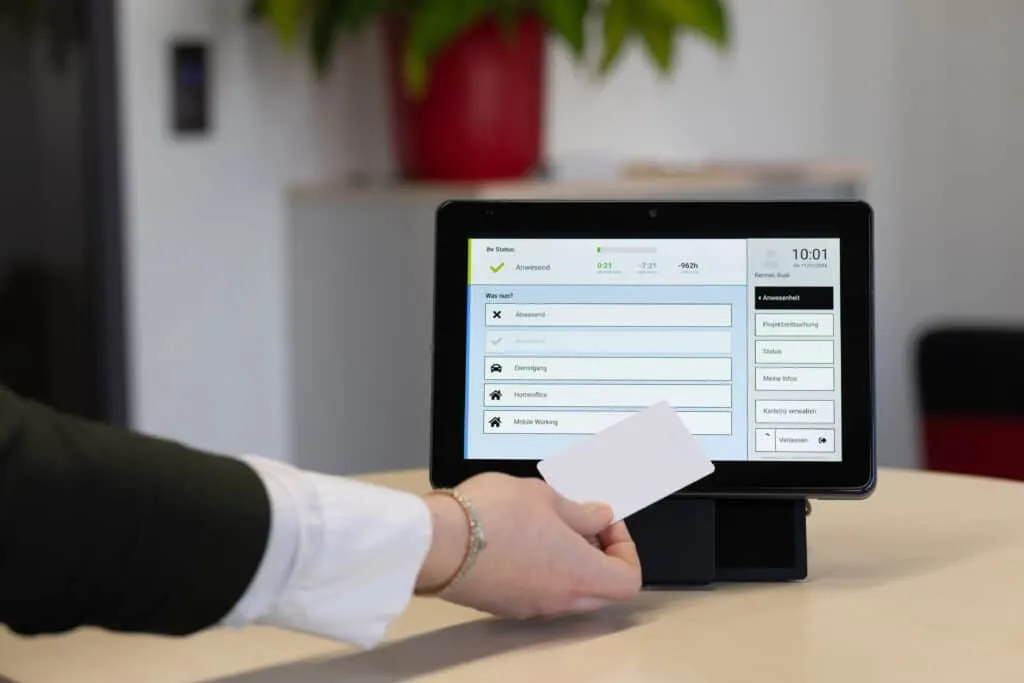Digital time tracking in Austria: Labor law requirements for 2026

The Digital time tracking has become an integral part of everyday working life in Austria. The legal requirements for documenting working hours are clearly regulated and binding for companies. If you want to be on the safe side as an employer or HR manager, you should know the most important requirements, obligations and options.
In this article, you will find out which labor law requirements must be observed when recording time in Austria, which systems have proven themselves and how you can work efficiently and legally compliant with modern solutions.
What is the legal basis for time recording?
The most important legal foundations are the Working Hours Act (AZG) and the Work Rest Act (ARG). These laws not only regulate the daily and weekly working hours, but also specify the rest periods that must be observed and how overtime must be accounted for.
Because the legislator wants to protect the health and rights of employees, the Obligation to record working hours anchored in § 26 AZG. This obligation applies to almost all companies - regardless of their size.
How the collective agreement influences time recording
If you are a company in Austria recording the working hours of your employees, you should not only keep an eye on the Working Hours Act, but also on the applicable collective agreement. This is because the collective agreement may contain additional regulations that are important for your industry or company.
The most common points regulated in the collective agreement include
- Special working time models: Some collective agreements allow flexible working time arrangements, such as flexitime or annual working hours, which go beyond the legal requirements.
- Rest periods and breaks: The rest periods stipulated by law can be adapted or extended by the collective agreement.
- Bonuses and overtime: The collective agreement often contains more detailed provisions on overtime, bonuses or night work.
- Documentation obligations: In some sectors, the collective agreement stipulates how and to what extent working hours must be documented.
Because the collective agreement is binding for many companies, you should regularly check the regulations it contains and integrate them into your time recording. This will ensure that you comply with both the statutory and collective agreement requirements and thus avoid legal risks.
What must be recorded according to the Working Hours Act (AZG)?
The Working Hours Act in Austria stipulates that companies must record and document certain data. The most important points include
- Start and end of daily working hours - including field service, travel time and training
- Duration and location of rest breaks - After six hours of work, a break of at least 30 minutes is mandatory
- Weekly working hours - the total number of hours worked per week
- Overtime - these must be shown in the payroll statement at the latest
- Daily and weekly rest period - at least eleven or 36 hours
- Working during rest periods and on public holidays - Place, duration and type of employment
- Calculation period - with flexitime or similar models
Because the data must be verifiable at all times, a Digital time tracking the task clearly.
What systems and methods are available for time recording?
For the Working time tracking various methods are available. Companies have the flexibility to choose the solution that best suits their requirements.
The most common systems include:
- digital time clock (time tracking terminal)
- Digital time recording software
- Cloud-based time recording solutions
- Mobile time recording (for field service and home office)
- Manual records on paper or in Excel (usually only useful for small companies)
Because many solutions can be integrated into existing ERP systems, they simplify billing and evaluation enormously.

Time recording in the home office and in the field: What applies?
For employees in the Home office or in the Field service the same legal requirements apply as for office workers. This means that the start, end and duration of daily working hours and the location of rest breaks must be documented. Digital time recording makes this task much easier because it can be used flexibly and from any location.
A particularly practical feature is the option of recording working time directly on the Smartphone to record. Modern time recording apps make it possible to record working hours and breaks at any time and from anywhere, without the need for additional hardware. This means that both employers and employees benefit from simple, efficient and legally compliant time recording - whether they are working from home, on the move or at different work locations.
Special regulations and exceptions for time recording
The AZG defines two exceptions that are exempt from the recording of working time:
- Senior executives:
Employees with significant independent decision-making authority whose working hours are not measured or predetermined or who can determine their own working hours in terms of location and duration. - Close relatives:
Parents, children, spouses, registered partners and cohabiting partners who have lived in the same household as the employer for at least three years - also only if their working hours are not measured or fixed in advance.
Mobile and cloud-based time recording solutions
Because flexibility and efficiency are becoming increasingly important, many companies rely on Mobile time tracking and Cloud-based time recording solutions. These offer numerous advantages:
- Location-independent use - Ideal for home office and field service
- Automated evaluations - of overtime, vacation or sick days
- Integration into existing systems - such as ERP or payroll accounting
- Simple operation - through special apps for smartphones
Because the data is stored in encrypted form in the cloud, it is available for analysis and billing at any time.
Advantages of digital time recording for companies and employees
Because the Digital time tracking offers many advantages, more and more companies are turning to modern solutions.
The most important advantages include:
- Transparency: All working hours are traceable and documented.
- Legal certainty: Compliance with all legal requirements is guaranteed.
- Time saving: Automated evaluations and billing save time.
- Flexibility: Mobile and cloud-based solutions enable location-independent working.
- Simple integration: Connection to existing HR and payroll systems is possible without any problems.
Digital time recording as the key to compliance
Because the Digital time tracking is required by law in Austria, it is an important building block for compliance and fair working conditions. Modern Working time recording systems facilitate implementation and offer numerous additional functions that benefit both companies and employees.
Those who rely on modern Time tracking software is on the safe side and can concentrate on the essential tasks1.
Mandatory information for time recording
| What needs to be recorded? | Details/comment |
|---|---|
| Start/end of working hours | For each working day, incl. field service/travel time |
| Rest breaks | Duration and location, at least 30 minutes after 6 hours of work |
| Weekly working hours | Total hours worked per week |
| Overtime | Show in the payroll statement at the latest |
| Daily/weekly rest period | At least 11 or 36 hours |
| Working on public holidays | Place, duration, type of employment |
| Calculation period | For flexitime or similar models |
FAQ on digital time recording in Austria
What must be recorded when recording time in Austria?
The start and end of daily working hours, duration and location of rest breaks, weekly working hours, overtime, daily and weekly rest periods and work during rest periods and on public holidays must be documented.
Does the time recording obligation also apply to employees working from home?
Yes, working hours must also be recorded when working from home.
Who is responsible for time recording?
The employer is responsible, but can appoint a representative or delegate the recording to the employees. However, control remains with the employer.
Which systems are permitted for time recording?
Paper, Excel, digital time recording software, time clocks, mobile apps and cloud-based solutions are all acceptable. It is important that documentation is complete and traceable.
Are there exceptions to the time recording obligation?
Senior employees do not have to keep records of working hours.
What happens if time recording is not carried out correctly?
Violations can lead to fines and, in the event of disputes in court, to evidentiary disadvantages for the employer.
Individual advice on digital time recording
Do you have questions about digital time recording or would you like to know how to implement the legal requirements in Austria securely and efficiently? We are happy to support you with customized advice - tailored to the needs of your company.
Whether you are looking for a suitable time recording solution, have special documentation requirements or would like to find out about current developments in employment law: Our experts are always at your disposal.